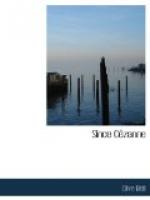Impressionistic criticism of literature is not much approved nowadays, though Mr. Arthur Symonds and one or two of his contemporaries still preserve it from the last outrages of a new and possibly less subtle generation, while M. Proust, by using it to fine effect in his extraordinary masterpiece, may even bring it again into fashion. But it has got a bad name by keeping low company; for it has come to be associated with those journalistic reviewers who describe, not the feelings and ideas provoked in them by reading a book, but what they thought and felt and did at or about the time they were supposed to be reading it. These are the chatterboxes who will tell you how they got up, cut themselves shaving, ate sausages, spilt the tea, and nearly missed the train in which they began to read the latest work of Benedetto Croce, which, unluckily, having got into conversation with a pretty typist or a humorous bagman, they quite forgot, left in the carriage, and so can tell you no more about. But this is not Impressionism, it is mere vulgarity.
If in literary criticism the impressionist method is falling into disfavour, in the criticism of music and painting it holds the field. Nor is this surprising: to write objectively about a symphony or a picture, to seize its peculiar intrinsic qualities and describe them exactly in words, is a feat beyond the power of most. Wherefore, as a rule, the unfortunate critic must either discourse on history, archaeology, and psychology, or chatter about his own feelings. With the exception of Mr. Roger Fry there is not in England one critic capable of saying so much, to the purpose, about the intrinsic qualities of a work of visual art as half a dozen or more—Sir Walter Raleigh, Mr. Murry, Mr. Squire, Mr. Clutton Brock, Sir Arthur Quiller-Couch, and Mr. McCarthy to begin with—can be trusted to say easily, and, if necessary, weekly, about the intrinsic qualities of a book. To be sure, Mr. Fry is a great exception: with my own ears have I heard him take two or three normally intelligent people through a gallery and by severely objective means provoke in them a perfect frenzy of enthusiasm for masterpieces of utterly different schools and ages. Doubtless that is what art-criticism should be; but perhaps it is wrong to despise utterly those who achieve something less.
Just at present it is the thing to laugh at biographical and historical critics, a class of which Sainte-Beuve is the obvious representative, and to which belong such writers as Taine and Francesco de Sanctis and all who try to explain works of art by describing their social and political circumstances. “At any rate,” it is said, “these are not critics.” I shall not quarrel over words; but I am persuaded that, when they care genuinely for books and have a gift of exposition, these perform the same function as their more aesthetically-minded brethren. I am sure that a causerie by Sainte-Beuve often sends a reader, with a zest he




